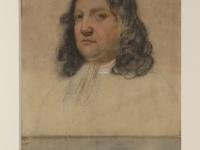In 1701, William Penn created a Charter of Privileges for the residents of his colony. Penn envisioned a colony that permitted religious freedom, the consent and participation of the governed, as well as other laws pertaining to property rights. The Charter of Privileges recognized the authority of the King and Parliament over the colony, while creating a local governing body that would propose and execute the laws. Penn clearly states the responsibilities the citizens have in selecting virtuous men to lead and govern.
William Penn's Charter of Privileges
Home ›
Education ›
Unit Plans ›
William Penn's Charter of Privileges ›
William Penn's Charter of Privileges
William Penn's Charter of Privileges
Essential Questions
How can the story of another American, past or present, influence your life?
What document or physical representation best summarizes Pennsylvania and why?
Objectives
- Students will be able to analyze the interaction of cultural, economic, political, and social relationships at the time of the creation of the Charter of Privileges.
- Students will be able to construct a biography of a William Penn and generate conclusions regarding his qualities and limitations.
- Students will be able to summarize the privileges and responsibilities granted to the citizens of Pennsylvania.
Other Materials
Suggested Instructional Procedures
Primary Source
Process
- Introduce William Penn and the founding of Philadelphia. Review the role that the Quaker faith played in Penn drafting his Charter of Privileges (include major names, events, and vocabulary words).
- Have the students take notes on the author, year, title, and possible audience for each document.
- Assign the readings either as homework or in class.
- Listed below are a few questions / assignments that maybe used as review of the reading.
- Have students compare and contrast William Penn's Charter of 1701 with any of the following documents; The Declaration of Independence, The Articles of Confederation, The Constitution, or the Bill of Rights. Most of these documents can be found in either a textbook or through the "Preserving American Freedom" project.
- Have students compose a short summary of the Charter of Privileges. When complete answer the question. In your opinion what privilege is the most significant?
- To what extent did William Penn create a unique colony based on natural rights? Why is Penn's vision different from other colonies and England? Explain.
- In what ways did Penn create a charter that allowed his citizens to enjoy the most freedoms? Explain.
- In groups have students create their own questions developed from the document. Students may answer their own questions as an assessment.
Vocabulary
The unit and lesson plan are a part of Preserving American Freedom, which presents and interprets fifty of the treasured documents within the vast catalog of the Historical Society of Pennsylvania. The documents read online will contain annotations that define and explain key terms, figures, and organizations.
Related Resources for Students

Unit Plan:
Plans in this Unit
Grade Level
Middle School
Duration
1 class period with homework
Standards/Eligible Content
8.2.7.B
8.2.8.B
8.2.6.A
8.2.6.B
8.2.7.A
8.3.8.A
Funder
The Freedom Teacher Fellow was funded through a Bank of America grant for the digital history project Preserving American Freedom.
About the Author
This unit was created by David Reader, HSP's Freedom Teacher Fellow in the summer of 2012. David is a social studies teacher at Camden Catholic High School.
Attention Teachers!
Let us know how you used this plan and be featured on our site! Submit your story here.

